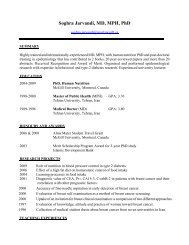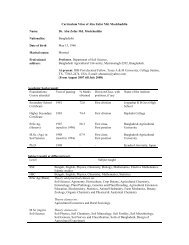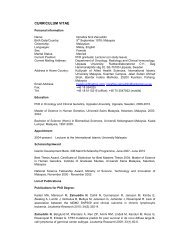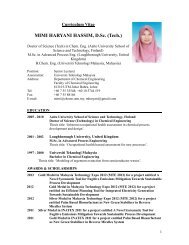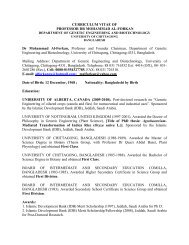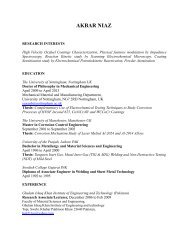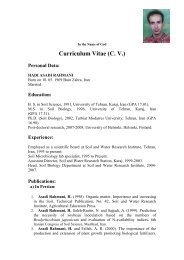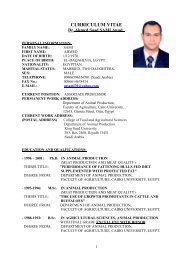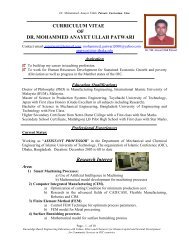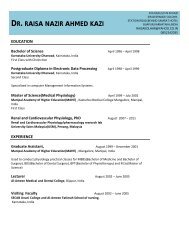Engineering: issues, challenges and opportunities for development ...
Engineering: issues, challenges and opportunities for development ...
Engineering: issues, challenges and opportunities for development ...
You also want an ePaper? Increase the reach of your titles
YUMPU automatically turns print PDFs into web optimized ePapers that Google loves.
ENGINEERING: ISSUES CHALLENGES AND OPPORTUNITIES FOR DEVELOPMENTSustainability at Arup■■1946: Arup founded by Ove Arup, Danish philosopher<strong>and</strong> engineer, proponent of a multi-disciplinaryapproach to design that included societal factors as wellas design <strong>and</strong> technical <strong>issues</strong>.1970: In a seminal speech to the firm, Ove Aruparticulated his vision of the firm’s obligation to ourenvironment. The speech is still relevant today.■■■1998: Arup adopts as its mission ‘we shape a betterworld’. It underlines the significant impact the firm hason almost all aspects of the built environment.2001: Arup’s first sustainability <strong>for</strong>um at Boston’sMassachusetts Institute of Technology.2005: Forum <strong>for</strong> the Future sustainability presentation toArup’s global strategy meeting.■■2007 (September): Sustainability policy is ratified,recognizing the wider influence we have in the work wedo <strong>for</strong> our clients, as well as by running our business ina sustainable way.2008 (March): Sustainability Statement published.The author’s aspiration is that eventually, over time, we willnot talk about sustainable design because it will be simply apart of what we always do as ‘business as usual’. It’s the onlyway we can fulfil our obligation towards social responsibilitywithin our field as engineers.2.4.3 Corporate SocialResponsibilityPetter MatthewsCorporate Social Responsibility (CSR) has moved from themargins to the mainstream, from a preoccupation with publicrelations <strong>and</strong> philanthropy, to a concern with a range of strategic<strong>issues</strong> that are of critical importance to policy-makers<strong>and</strong> practitioners. It has become inextricably linked with thekey global <strong>challenges</strong> of our time including governance, climatechange, security <strong>and</strong> international <strong>development</strong>. Andmost importantly, CSR is now seen as a mechanism throughwhich the skills, technology, economic power <strong>and</strong> global reachof the private sector can be applied to the <strong>challenges</strong> of fightingpoverty <strong>and</strong> achieving the Millennium Development Goals(MDGs).Given these <strong>development</strong>s, it is perhaps surprising that CSRremains so poorly understood <strong>and</strong> that there are still so fewexamples of it having directly contributed to poverty reduction.CSR as a discipline still lacks well elaborated methodologiesto capture its effects, <strong>and</strong> <strong>for</strong> many companies it is nomore than a gloss on what is essentially ‘business as usual’. Theprivate sector has benefited from improved markets access inrecent years, but has not yet fully understood that these benefitsare accompanied by new social responsibilities. Businessas usual is a wholly inadequate response given the critical <strong>challenges</strong>that we face. Systemic change is necessary. This meansdeveloping new <strong>and</strong> innovative business models, trans<strong>for</strong>mingbusiness management systems <strong>and</strong> building genuine crosssectoralpartnerships. In effect, the challenge is to develop a‘second generation’ of approaches to CSR.This paper focuses on the implications of this <strong>for</strong> the engineeringindustry. While recognizing the crucial role of small<strong>and</strong> medium enterprises, it is concerned primarily with therole of large international companies. It begins by summarizingthe objections to CSR that in themselves constitute barriersto progress. It goes on to explain why CSR is especiallyrelevant to the engineering industry, <strong>and</strong> discusses a practicalmethod <strong>for</strong> selecting <strong>opportunities</strong>. The paper concludes byconsidering the implications of failure of CSR <strong>for</strong> business <strong>and</strong><strong>for</strong> society.Objections to CSRObjections to CSR are made by opponents to it from acrossthe institutional spectrum. Those opposed to CSR from a‘campaigning’ perspective dismiss it as a corporate-drivendistraction that diverts attention from the need <strong>for</strong> properen<strong>for</strong>ceable regulation. 41 They argue that only the state is m<strong>and</strong>atedto protect the public interest, <strong>and</strong> question the legitimacyof corporate influence over public policy. It is of coursetrue that regulation is often very weak, particularly in developingcountries, <strong>and</strong> this situation is sometimes exploited byirresponsible companies. In fact, it is the absence of regulationthat has acted as a driver of CSR in many circumstances,as responsible companies have sought to compensate <strong>for</strong> thegovernance deficit. 42 However, a problem with the campaigningperspective is that it tends to pitch business interestsagainst society. Of course there are tensions, but there is alsointerdependence. A more fruitful strategy is to use this interdependenceto build symbiotic relationships so that business<strong>and</strong> societal interests become mutually rein<strong>for</strong>cing.Critics of CSR from the ‘market economy’ perspective arguethat business fulfils its role in society simply by pursuing itsown self-interest. 43 They reject measures to manage a company’ssocial impacts beyond those required by law <strong>and</strong> mar-41 See <strong>for</strong> example the work of the Corporate Responsibility Coalition (Core) at http://www.corporate-responsibility.org42 Marsden, C. <strong>and</strong> Grayson, D. 2007. The Business of Business is . . .? Unpicking the CorporateResponsibility Debate, The Doughty Centre <strong>for</strong> Corporate Responsibility, CranfieldSchool of Management.43 Hopkins, M. 2006. Corporate Social Responsibility & International Development,pp. 17–19, Earthscan, London.50




